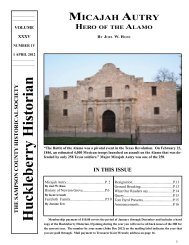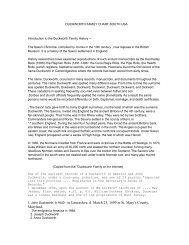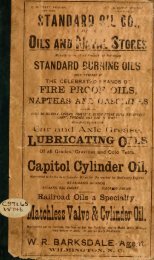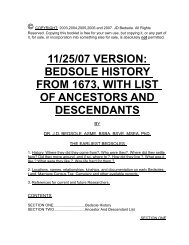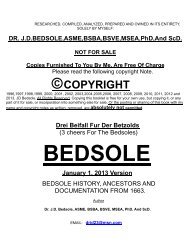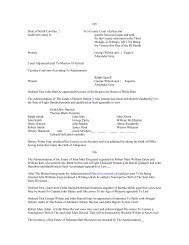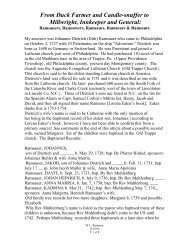Bedsole History from 1673 With Documentation - NCGenWeb
Bedsole History from 1673 With Documentation - NCGenWeb
Bedsole History from 1673 With Documentation - NCGenWeb
You also want an ePaper? Increase the reach of your titles
YUMPU automatically turns print PDFs into web optimized ePapers that Google loves.
such as tobacco, cotton and tar so they could receive these products and also coincidentally, so they could<br />
tax such settlers, thereby fattening their own governments coffers.<br />
Then it was made known that the English government would also allow such settlers to leave the new land to<br />
their children as entitlements <strong>from</strong> the parents, when the parents died. I'm sure it seemed too good to be true<br />
and Abraham began to dream of the new land and to make plans to go there to live. His parents encouraged<br />
PAGE 10<br />
him, but also warned that it would not be easy, going to a new land with practically nothing except the clothes<br />
on his back, to travel and live among total strangers, with so many inherent dangers and unknowns involved,<br />
and the inhuman hardships and suffering that were bound to be incurred. He never dreamed how the<br />
suffering and hardships would be proved without question and many times over. So, true to his German<br />
ancestry he was stubborn, and one day in 1700, he said goodby to his family and together with a friend his<br />
own age, began the trek to look for some way to catch a boat to the big seaport and to leave for the new<br />
country.<br />
Abraham and his friend probably found a small commercial boat working a river and convinced the owner to<br />
transport them downstream to the seagoing port in return for a week of manual labor helping the owner load<br />
and unload trade goods with which he bartered, bought, sold and made a living on the river. At the seaport,<br />
when their fare was finaly paid, they were on their way. At that time, the captains of the large, seagoing ships<br />
had learned they could transport new settlers to what later became America and collect their fares upon<br />
arrival, <strong>from</strong> earlier and richer settlers who needed laborers here. (During the period 1700-1712, there was a<br />
huge influx of Palatines <strong>from</strong> Germany into the U.S).<br />
Note: Sailing From Germany To "The New Country" A Typical Trip To America Went Like This Too<br />
Often:.From An Old English Admiralty Court Case I included this to show how they were mistreated back<br />
then. It also explains why one cannot find ancestors whom they thought shipped <strong>from</strong> England or Germany<br />
to the United States.<br />
James Hogg's brother settled in Wilmington, N.C. many years ago and at his solicitation James decided to<br />
also go settle there. When this was learned in Caithness England, many people applied to Hogg to freight a<br />
vessel (rent it) to carry them all to "The Carolina's". Accordingly, on 24, Aug., 1773, Hogg contracted with<br />
Inglis to freight the ship, Batchelor of Leith, Ramage Alexander, Master, to carry James Hogg of Borland in<br />
Caithness, his family and servants, and 200 emigrants <strong>from</strong> Thurso to Wilmington, N. C. Hogg agreed to pay<br />
for himself, wife, Mrs. Alves (his mother-in-law) a specified rate, another for his children, a third for his<br />
servants (the latter being restricted to six in number), a fourth for emigrants above the age of eight, and a fifth<br />
for emigrants under the age of eight (excepting children at the breast for whom there was no fare).<br />
The vessel was to be ready to depart Leith, England in July and was to proceed <strong>from</strong> Leith to Thurso Bay on<br />
Scrabster Road to load the passengers. Hogg arrived in Leith on June 15th and hung on until August 26,<br />
waiting for a full load of passengers. The vessel Batchelor then went to Thurso and was boarded by Hogg<br />
and his family and servants, and 204 emigrants (many <strong>from</strong> the County of Sutherland).They sailed two<br />
months behind schedule, <strong>from</strong> Thurso on Sept. 14, but they were soon forced to harbor <strong>from</strong> contrary winds<br />
at Stromness in Orkney, where they put the passengers ashore for eight days. On October 3, two days after<br />
leaving Stromness, due to storm damage to the ship, they were then obliged to put into Vaila Sound in<br />
Shetland where the passengers were again put ashore. Here the Batchelor was again damaged by a storm<br />
<strong>from</strong> which they were sheltering. Hogg, his family, and the 204 emigrants wintered at Vaila Sound. The<br />
following Spring, April 20, 1774, eight months after initially boarding, they departed for Leith in order for the<br />
ship to have the necessary repairs made. At Leith, Inglis declared the contract at an end and declared he<br />
was entitled to the fares upon landing them at Leith as he would have been had he landed them at



